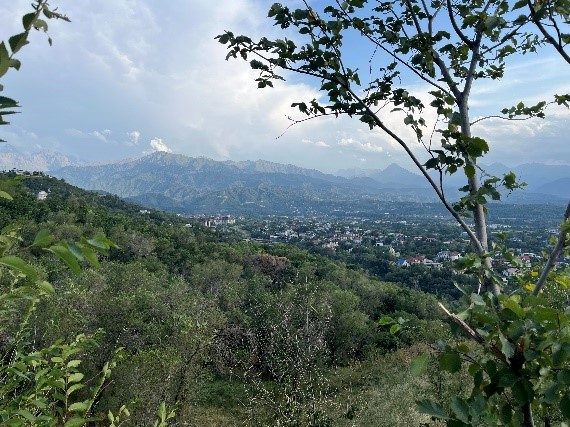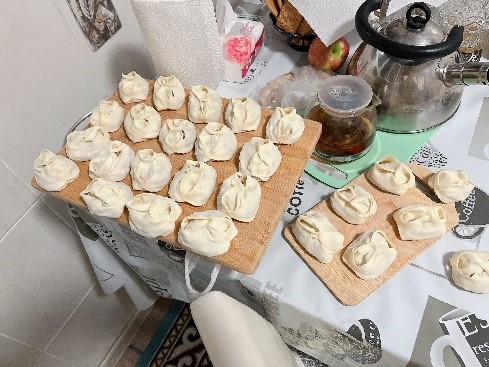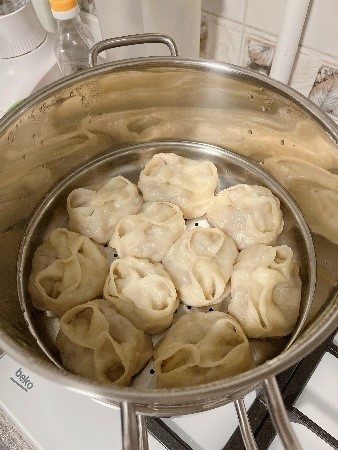Training Report
School of Humanities and Culture, College of Humanities
Ikezoe Risa (4th year)
1. Motivation for participating in the training
I studied at the Preparatory Faculty of Kazakh National University for a year from March 2023 to March 2024, and from September to March of the following year I studied in Kazakh language classes, but after returning to Japan, I had a strong desire to learn more Kazakh language locally. After graduating from university, my dream is to work in a job that contributes to international relations between Japan and Kazakhstan, making use of the Russian and Kazakh languages I have studied so far. The “Kazakh Overseas Language Training” program that I participated in this time was very attractive because I could take Kazakh language classes for about one month while staying with a Kazakh family. My motivation for participating in the training was that I thought that I would definitely be able to greatly improve my ability to use the Kazakh language through the training.
2. Training
I had classes every weekday from 10am to 1pm, ate lunch out, and was free to spend the afternoon meeting with local friends and acquaintances or going sightseeing with fellow international students. For the first two weeks, I took grammar and conversation classes with students from Hankuk University of Foreign Studies, and for the last two weeks, I read a variety of short Kazakh literature for children one-on-one with the teacher. I think it was good that I was able to improve my conversation skills mainly during the first two weeks, and then improve my reading comprehension and vocabulary during the last two weeks. The reading comprehension classes in particular were extremely effective, as they not only involved reading stories, but also practicing verbally summarizing the contents of the stories I had read and introducing the contents of similar Japanese stories. Also, there were two days of intensive lectures on CiC special subjects in English in September. The course consists of a three-hour lecture on international relations on the first day and a three-hour lecture on geography on the second day, for a total of six hours. In the international relations lecture, there was a two-hour lecture on what cases of immigration exist and the advantages and disadvantages of immigrating, and for the last hour, students had to create a mini-poster based on the assigned task and explain it orally to the professor. The geography lecture included short lectures on climate change in Kazakhstan and urban planning in small and medium-sized cities, and there was also time to visit laboratories equipped with measuring equipment. The highlight of the training outside of class is the field trip to Charyn Canyon and the Tanbalytas ruins. Charyn Canyon is the second largest canyon after the Grand Canyon in the United States, and I was able to fully experience the majesty and beauty of Kazakhstan’s nature. Tanbalytas is an archaeological site with rock paintings from BC, and it was an extremely valuable experience for me to work with students studying Japanese at the local Japanese language department to translate the guide’s explanations from Kazakh into Japanese. During my stay, I stayed with a Kazakh family, and I have no doubt that this experience also greatly helped me improve my conversational Kazakh skills. I spoke a lot of Kazakh with my host family almost every day, and they were so kind to me, taking me to the village where their family lives and to dinner parties at the homes of their mom friends. The meals were delicious every day, and I am truly grateful to have met such a wonderful host family, including my host mother, Aliya. Aliya-san will be mentioned many times in the report later, but in Kazakhstan, women are often referred to by their first name followed by the word “apai,” and as she was called Aliya apai locally, I will refer to her as Aliya apai from here on.
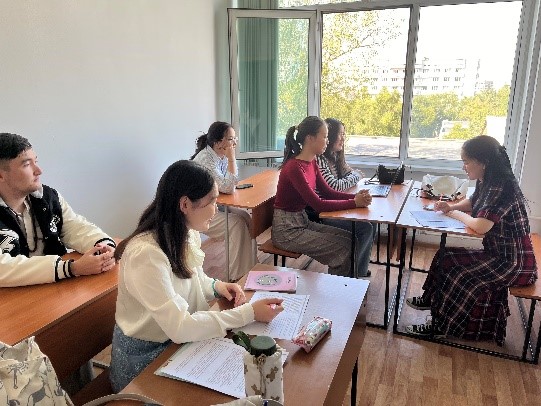
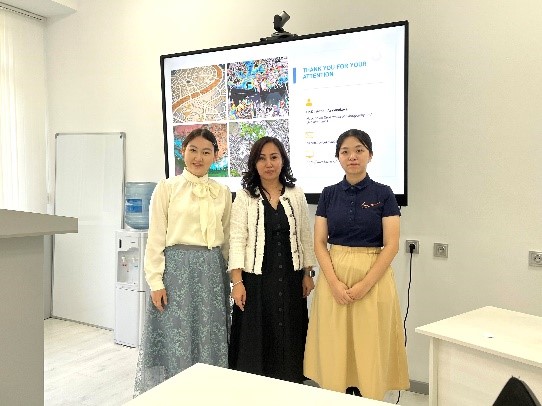
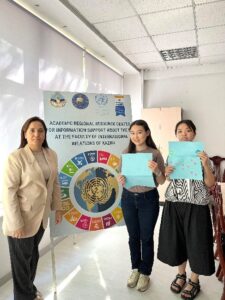
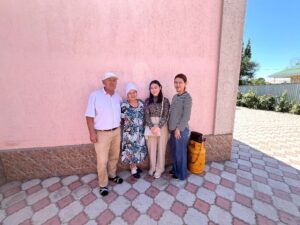
3. Areas of improvement after the training
The biggest improvement after the training was undoubtedly my ability to speak Kazakh. After returning to Japan after a year of studying abroad, I kept in regular contact with my Kazakh friends and continued to use Kazakh constantly, but I felt that my ability to use the language had deteriorated compared to when I was studying abroad. I traveled there with some anxiety that I might have forgotten a lot of Kazakh, but when I arrived, I strangely remembered how it felt to speak Kazakh. Since arriving in Kazakhstan, I have been using Kazakh almost every day, both at home and outside, and have absorbed many new expressions in my daily life. Coming to Kazakhstan again, more than just remembering the Kazakh language, I felt that my Kazakh language proficiency had improved even more than before. As a result, during my stay I was interviewed by national television as a Japanese girl who could speak Kazakh, and the interview was broadcast to coincide with the “Kazakh Language Day” on September 5th. Being interviewed by the Kazakh media was something I had never experienced during my previous one-year study abroad, and it was a very memorable memory of this training. When I told the interviewer that I had been studying Kazakh for seven months, or one year since I started, she was surprised and praised me for my efforts in becoming fluent in such a short period of time. As someone who loves Kazakhstan, I am truly happy to have so many Kazakh people thank me for cherishing and continuing to learn the Kazakh language, and this training has given me great motivation to continue working hard to study Kazakh in the future.
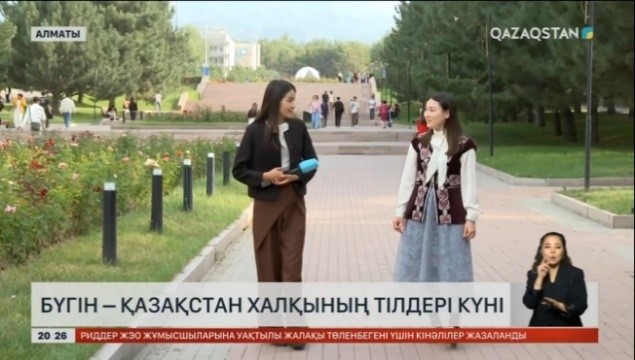
4. Consideration of the training destination
I had studied abroad in Kazakhstan for a year until March of this year, so this was not a training program in an unknown country, but I still learned a lot of new things about Kazakhstan and the way of thinking and the spirit of the Kazakh people. During my stay I did homestays and had many opportunities to visit as a guest, so what I felt particularly during the training was the Kazakh people’s way of thinking, which is to value their guests. First of all, in Kazakhstan there is a belief that visitors are sent by God. In fact, at my homestay, I was served a lot of delicious Kazakh home-cooked meals almost every day. One of my fond memories of Ariya apai is that when my hand stopped moving during a meal, Ariya apai would smile and offer up food, saying, “Try this, and try that,” and I would reply, “It’s okay, I’m eating just fine,” and we would both look at each other and laugh. One day, I said to Aliya apai “I’m getting chubby because I eat delicious food every day until I’m full,” and she said, “That’s good! It would be terrible to say that I made a guest go home skinny,” and I strongly felt the Kazakh people’s respect for their guest. Also, when we visited Aliya apai’s family village, we were treated to kohldak, and when we visited a friend’s house, we were treated to beshbarmak, what was most impressive was that they both clearly stated that they had made these dishes either for me as a guest, or for Aliya apai and me. The word қонақжай (read as “konakjay,” meaning “guest lover” in Kazakh) is often used to describe the character of Kazakhs, and the training program allowed me to experience the spirit of Kazakhs’ love for their guest in various situations.
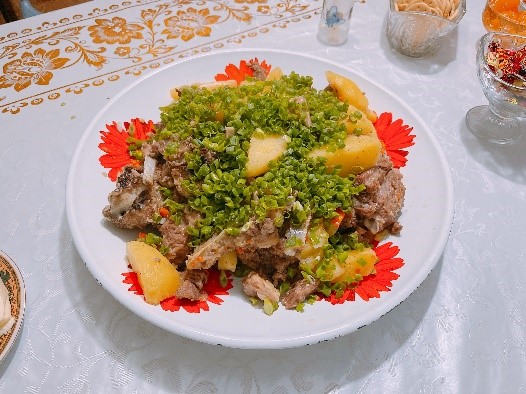
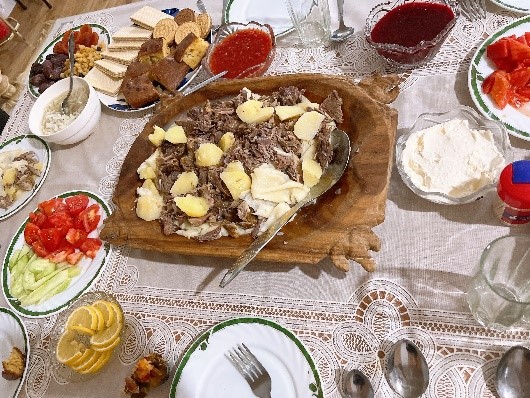
5. Training Outcome
This was my second time studying abroad in Kazakhstan, and I experienced many things that I could not experience in my previous one-year study abroad, and it was a very fulfilling study abroad. For example, in terms of classes, there were not only Kazakh language classes, but also special CiC subjects in English, so I thought it was great that I was able to learn about international relations and geography from the Kazakh perspective. And in terms of improving my Kazakh language skills, which was my main purpose for participating in the training, the homestay was truly effective. I talk a lot with my host mother, Aliya apai, almost every day, and I rarely have trouble understanding or responding to everyday conversations, so I feel like I’ve improved a lot. Aliya apai worked from morning until night, but even though she was busy and tired, she still cooked delicious meals and spent a lot of time with me, and I would like to express my sincere gratitude to her. Aliya apai and I both shared a love of Kazakh music and artists, and we would sometimes listen to music on YouTube together during dinner. During my homestay, I was truly immersed in the Kazakh language every day, and I believe that homestay is an effective way to learn a language. A few days before returning Japan, I was truly honored to be interviewed by a television station as a Japanese person who can speak Kazakh, and when I was praised for my fluent Kazakh language, I felt that the Kazakh learning I had acquired during this training had paid off.
What made me happiest about this training was being able to meet again, for the first time in five months, with the teachers and friends I had met during my previous year of study abroad, and also making new friends and important people during this training. When I first came to Kazakhstan to study last year, I had no acquaintances or friends, and I started from scratch with no relationships at all. Now, I feel truly grateful and happy that Almaty has become a place that I can consider a second home, with so many precious friends, teachers, and acquaintances. One of the results of the training is that I have been able to continue to build close relationships with my dear friends, teachers, and acquaintances that I have met in Kazakhstan, and I am reminded that studying abroad is not limited to academics. The experiences, learnings, and connections I gained through this training program are truly invaluable, and I would like to express my sincere gratitude for having had the opportunity to participate in this wonderful training program.
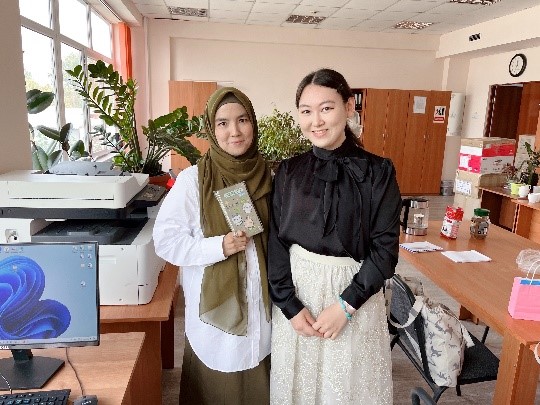
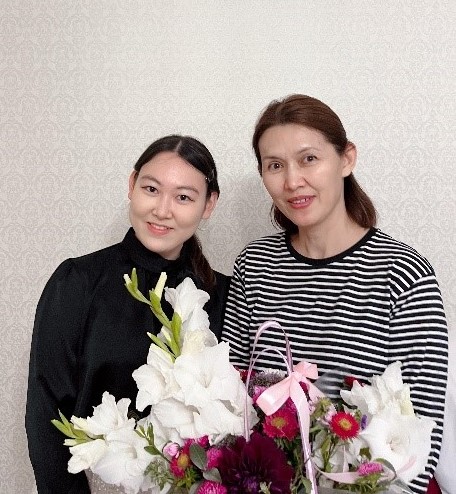
Extra Edition ~My Happy Homecoming~
Here, as a special feature for public relations purposes, I would like to look back on this Kazakh language training along several themes. I completed my one-year study abroad in Kazakhstan in March 2024, and this was my second time studying abroad in Almaty. For me, who considers Almaty, Kazakhstan to be my hometown, studying abroad is like a homecoming to my parents’ home, which is why the subtitle is “My Happy Homecoming.
1. Ranking of unforgettable memories of the training
This Kazakh language training was truly fulfilling and enjoyable. Here, I would like to introduce three of the most unforgettable memories of the training.
No. 2 Sushi roll party at homestay house
No. 3 International Karaoke
First, the third place “International Karaoke” refers to the time when I went to karaoke with my Kazakh friend Ayaurum, who I’ve been close with since my year of study abroad, and his friends Sergey and Cindy. Cindy is Belgian and Sergey is Kazakh but has Russian and European ancestry, and it was a fun evening singing karaoke and talking in depth about each other’s national characteristics and values. It’s really wonderful to be able to make friends with various ethnic backgrounds through studying abroad.
The second most memorable event was the “sushi roll party at the homestay house” was the last Sunday of my stay when I invited my Dombra teacher and beloved sister, Guridana, and served her sushi rolls at the homestay house. Apparently it was the first time my host family had made sushi rolls, but I was glad that they said it was delicious and liked it. After the meal, the three of us, including Guridana, had a girls’ night out, eating cake and fruit that Ariyaapai had brought for us, and at the end, the two of us performed a dombra performance, making it an unforgettable and fun day.
Finally, in first place is “first overnight stay in the village”. This happened when I visited Aliya apai’s parents’ home, and as I wrote in the main article, it was something I was not able to experience during my one year study abroad. It was one of my dreams to visit a village in Kazakhstan, so it was an unforgettable and precious memory. Ariyaapai’s parents and siblings were also really kind and friendly people, and I really enjoyed the two days I spent with them. I would be happy to meet the parents and siblings again when I visit Kazakhstan.
2. 5 delicious dishes from Aliya apai
One thing that made me happy during my homestay was the food, which was delicious every day. Aliya Apai was really good at cooking and had many variations of dishes, so in my heart I called her “the genius chef Aliya-sama.” From here, I would like to introduce five particularly delicious dishes that Aliya apai made, along with a brief comment.
Item 1: “Doner”
First of all, I was surprised to see doner for breakfast. I fell asleep twice that day and was woken up by Aliya apai, I sat down at the table half asleep, but the doner was so delicious that it woke me up! Once you try Aliya apay’s doner, you will never be able to eat restaurant doner again!
Item 2: “Manti”
Manti is a Kazakh home-style dish similar to dumplings, with handmade skins and fillings of lamb and potatoes. The freshly made manti was juicy and really deliciou! Aliya apai’s dexterity in stretching and cutting the skin and wrapping the ingredients was truly a genius chef Aliya.
Item 3: “Blini”
Blini is a so-called crepe crust and is often served for breakfast in Russia and other former Soviet bloc countries. They are usually eaten with smetana, a dairy cream, or jam, but the blini stuffed with gritty cream cheese made by Aliya apai were exceptionally delicious!
Item 4: “Somen noodles with plenty of meat”
I don’t know the official name of the dish, but it is boiled somen noodles topped with plenty of minced meat. In Japan, somen noodles are synonymous with summer, but this dish also contains plenty of meat, making it a great way to stave off summer fatigue!
Item 5: “Borscht”
Borscht is a dish that can vary considerably depending on the restaurant and the person who makes it, but the borscht made by Aliya apai was packed with beets and not too strong in flavor, so it was really delicious! The borscht alone is enough to fill you up, and it’s a nutritious dish containing both vegetables and meat!
3. My view of the attractiveness of the training program
Lastly, I would like to convey the appeal of the training program. The appeal of this training is that it allows participants to deepen their understanding of Kazakhstan from various perspectives over the course of about one month through Kazakh language classes, special CiC courses in English, field trips, homestays, and more. If you live in Japan, you don’t often hear or see anything about Kazakhstan, but because it is a country that is not very familiar to many people, I would encourage everyone to visit at least once. The training also provides many opportunities to engage with students of the Japanese language department of the Faculty of Oriental Studies at Kazakh National University, making it a great place to make friends. Regarding the climate in Almaty, where the training took place, in mid-August the temperature only rises to around 30 degrees, and it is cool in the mornings and evenings. In late August it gradually starts to get cooler, and by September it is already a fully autumnal climate. Since Kazakhstan is drier than Japan, it is not hot and humid even when the temperature is high, and it was really comfortable during the training. I am sure that the training will open up a new world that you have never imagined before, and I hope that this report will encourage you to think about participating in the training.
